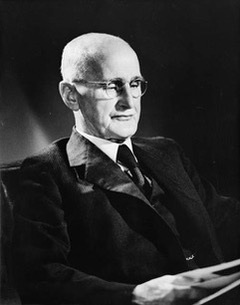Proof that trans-Tasman rivalry is not only on the sporting field arrives this November as Australia and New Zealand mark the introduction of public broadcasting.
While not an official race – Kiwis crossed the line two years ahead of their Aussie neighbours.
On November 17 1921, Professor Robert Jack, of the University of Otago began a service from Dunedin which, according to the New Zealand History website, ‘was heard as far away as Auckland’.
Across the ditch, Australia Post has issued a special stamp to celebrate the first officially continuously operational licensed radio station going to air on November 23 1923.
As the New Zealand government tightened its grip on the new media, Professor Jack’s station was allowed to continue with limited transmission under the callsign 4XD, and survives today as Radio Dunedin.
While Australia’s electronic media has developed in an orderly, if somewhat protected path, the documented history of New Zealand broadcasting has fascinated media watchers around the globe.
There are (seemingly) countless metropolitan and suburban stations up and down the country operating under one of the most deregulated broadcast systems in the world. High powered commercial FM stations in Auckland number almost 30, serving a population half the size of Sydney and Melbourne, each with only nine.
While Australia dithers on where DAB will go next, there are no plans to introduce it in New Zealand after a trial in Wellington and Auckland ended in 2018.
New Zealand radio’s transition from briefly private to full government control, then deregulation in 1988, resembles a game of political ping pong, leaving players and spectators wondering what’s coming next.
The most recent attempt came earlier this year when the former Labour government moved to merge commercial but state-owned TVNZ with non-commercial radio RNZ.
The plan was given the cold shoulder by former Prime Minister Chris Hipkins, just before last October’s election, and his National Party successor Christopher Luxon is unlikely to revisit the idea.
It will simply become another chapter in the history of New Zealand’s changing media landscape.
Having worked in public service broadcasting on both sides of the Tasman, it wasn’t until last month visiting family in New Zealand, that I had a strange reawakening to sounds and images of a bygone broadcasting era.
As a Kiwi raised in Levin, north of Wellington, the wireless, and the voices it brought into our living room was a focal gathering point typical of homes during the 1950s.
Selwyn Toogood’s nation-wide Lever Hit Parade, and Noeline Pritchard’s Auckland Hit Parade on 1YD were opening the ears of Aotearoa’s young and restless to a changing pop scene.
Like many teenagers becoming hooked on rock ’n roll, my elder brother Marshall and I would scan the dial from 1XN Whangarei to 4YZ Invercargill, straining through static for a signal after sunset when atmospheric conditions pulled in AM stations way beyond our nearest 2ZA Palmerston North.
On some nights, radio waves from across the Tasman could be heard with surprising clarity. 2UE Sydney’s Authentic Top 40, spun more chart toppers in one day than the ZB network offered in an entire week.
Around sunset, it was even possible to hear AM stations from the US west coast and Hawaii, without needing to search on Shortwave.. At the bottom of the dial, I recall capturing KPOA, a station in Honolulu, spinning the latest hits and a catchy jingle from sponsor, Lucky Lager Beer, sung to the golden oldie, ‘Hey Mr. Banjo (play a tune for me)’.
Our parents (my mother was a classical piano teacher) were hardly impressed by our domination of the family wireless and their need to hear more sedate offerings on the national YA and YC networks.
I still remember my favourite serial, The Adventures of Superman and its ZB sponsor Self Help grocery stores, which offered customers a free ink blotter bearing a red and blue picture of the Man of Steel along with the times of broadcast.
Professor Jack’s format of spoken word and music included the 1917 song ‘Hello My Dearie’, its lyrics hardly offensive to the most sensitive ears. But as the government-controlled New Zealand Broadcasting Service (NZBS) spread its net, lyrics would cause headaches for present and future custodians of the airwaves.
They had a habit of placing both hands firmly over their ears in the pursuit of maintaining standards of ‘good taste,’ but more so ‘protecting’ the morals of the nation’s youth.
These unseen censors simply banned records they considered ‘unsuitable for broadcast’ a system which had consequences.
When Bill Haley’s Comets started rocking around the clock and Elvis Presley put on his blue suede shoes, they didn’t exactly push easy listening Doris Day and Perry Como off the charts.
Australia’s ‘wild one’ Johnny O’Keefe’s hits were refused airplay on the basis they were too wild. O’Keefe cut short a New Zealand tour partly because some performance halls also banned him.
While his records spun wildly on stations across Australia, some prospective Kiwi fans said they had never heard of him.
American superstar Little Richard whose ‘Long Tall Sally’ sounded even more wild than O’Keefe, was another artist kept off the studio turntables.
A reporter for NZ Truth managed to either get, or surmise why the hits aired in Australia and other countries were not being played on NZBS stations in their monopoly of the airwaves.
The reasons were as fascinating as some of the lyrics which often left no room to the imagination of impressionable teens growing up in an era of Kiwi conservatism.
The reporter claimed Bobby Darin’s first major hit, ‘Splish Splash’ was banned because it suggested nude bathing parties. Indeed, the lyrics confirm he was probably right.
Elvis Presley’s ‘It’s Now or Never’, sung to the tune of ‘O Sole Mio’, might offend classical purists, the censors decided. But perhaps the most surprising artist to fall foul was Pat Boone, a devout Christian.
Climbing to Number 1 in the American and Australian charts, Boone’s ‘Wonderful Time Up There’, extolled the ‘glory’ of where believers would one day meet after their days on Earth were over.
It had a catchy gospel beat but was deemed unsuited to the ears of religious followers in New Zealand. Boone – whose clean cut boy next door image had a huge fan base – must have been stunned if, in fact he ever knew.
From boyhood listening in Levin, I graduated to a position behind the microphone in Broadcasting House, Wellington where my future wife, Robyn was a technical operator. We met through the soundproof glass while I announced and she played recorded features.
After the NZBS’s transformation from virtually a government department to corporation status in 1962, attitudes were changing both behind and beyond the NZBC microphones.
In a daring move 1965 saw the introduction of talk back radio, but with the precaution of delaying the outgoing signal in case of verbal mishaps.
In Wellington, Person to Person launched on 2ZB hosted by the unflappable Doreen Kelso, originally from Mildura. While the times were a’changing, they still had a long way to go in the corridors of broadcasting’s Wellington Head Office.
Just about any subject was up for discussion – except (wait for it) sex. politics and religion.
During a break in the Announcers Room, my news reading colleague Bill Toft, envisaged what the first caller would say, his acerbic wit in full mimic mode:
“Hello Doreen – could you please help me? I have a stain on my character and don’t know how to get it off.”
The day of my last news reading shift included a story about the departure for the Hauraki Gulf of MV Tiri and its crew of seafaring DJs in November 1966.
Launching Radio Hauraki and bringing private radio to the masses, ‘Splish Splash’ might have been an appropriate way to open their first show.

Main picture: Professor Robert Jack (The Encyclopedia of New Zealand)

